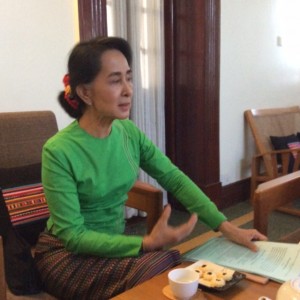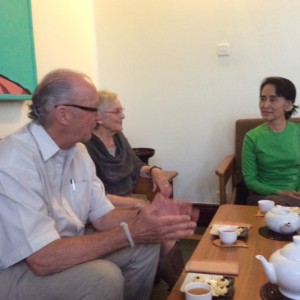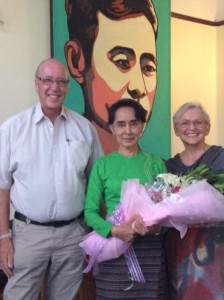Myanmar Election – The Essential Aung San Suu Kyi
Reports about the Myanmar election almost universally begin with the name ‘Aung San Suu Kyi’ followed by the intended message. It is interesting to look at the unique role played by this remarkable woman and what her role has been and will be in the future.

Aung San Suu Kyi is a great conversationalist but has a clear idea of her objectives. Many world leaders pass through her living room!
It can be argued that without her role and persona there would not even have been an election or certainly not an election that represented as great a possibility for political change. Aung San Suu Kyi is the daughter of Aung San, considered the father of the nation of modern Burma who was assassinated six months before independence when she was barely two. She became an exile, mother, scholar and an accidental politician and tragic heroine at the age of 45.
Aung San Suu Kyi lives in a part of the world notable not only for family dynasties, but dynasties where frequently a daughter becomes an important and forceful leader after the death of her father – think Indira Ghandi. The ethnic history of Burma with the dominant Burmans, of which she is a member, plus an official 135 ethnic entities hardly provides the basis for political unity. The military attempted to force unity through compulsory assimilation around an ideology resulting in a catastrophic legacy of conflict.

Aung San Duu Kyi challenges the military Government from a corner of her living room. Her only weapons are a cup of tea plus her forceful personality.
Aung San Suu Kyi accidentally and providentially entered this political drama 25 years ago wearing the mantle of legitimacy provided by her father. Becoming the tragic heroine imprisoned in her own home and separated from family gave her a legitimacy and a power that is genuinely her own. She has been able to represent national unity based on her personality and personal history allowing groups and voters beyond her core Burman base to see her as a representative of their aspirations. In her absence any election would have likely resulted in an outcome that strictly followed ethnic lines allowing the military to justify their continued domination of political life.
Aung San Suu Kyi is a formidable opponent to the reluctant military leadership. At the biblical age of a completed life – three score and ten – it can be argued that she has spent her entire life preparing for this moment. History will judge how well she handles the challenge of real power. She will unquestionably become the power behind the throne if not on the throne – but Burma still will struggle with a Constitution that in many respects is short of a real democracy. Very recently eight ethnic groups signed a comprehensive ceasefire – but eight other groups are still waiting cautiously before signing. Creating confidence that the new Burma under her leadership will be genuinely inclusive will be an early test.
Burma has many additional challenges. Aung San Suu Kyi has been criticized for not taking a more forceful public stance in favor of the inclusion of the persecuted Muslim Rohingya minority. I had the opportunity to personally ask her that question several months ago. In the privacy of her home she asserted that a path to citizenship must be found. Her unstated reality however was that becoming champion of unpopular causes before the election might prevent the very outcome that will permit her to become author of change.
Aung San Suu Kyi is cultured, intelligent and gracious. Her hair is black, her body taut, she listens well and responds with confidence. Her ship has come in and now she has the challenge and opportunity of writing the other half of her personal history and hopefully of the people and nation of Burma.




